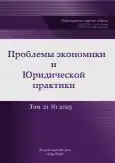Information Policy of the Russian Federation: Legal and Administrative Aspect
- Authors: Zubov V.V.1
-
Affiliations:
- Financial University under the Government of the Russian Federation
- Issue: Vol 21, No 1 (2025)
- Pages: 73-80
- Section: Public Law (State and Legal Sciences)
- URL: https://journal-vniispk.ru/2541-8025/article/view/289144
- EDN: https://elibrary.ru/VZVPFE
- ID: 289144
Cite item
Abstract
This publication is devoted to a comprehensive description of the current state of Russian information policy in terms of actual management practices and the legal and regulatory mechanism. The tasks of formulating the author's relevant concept of information policy, conducting a block (cluster) analysis of the main directions of information policy implemented in actual Russian political and legal practices, establishing legal problems of the current state of Russian information policy and forming proposals for resolving the identified difficulties are being solved. The following research methods are used: discursive and system-structural approaches, block (cluster) analysis, formal-legal method, literal, complex and contextual interpretation of legal norms. The author proposes the concept of information policy as an independent direction of the internal government course operating in the national political and legal order, expressed in the implementation by public authorities and civil society institutions of normative, managerial, broadcasting, preventive, suppressive and signaling measures within the established competencies aimed at ensuring a unified information exchange within the country and maintaining the information security regime. The propaedeutic, broadcasting, formal-legal, protective, control and supervisory, and suppressive blocks of Russian information policy are identified and characterized. The problems of the current state of information policy related to the absence of a codified comprehensive regulatory legal act on the issue of information legal relations and typology of information products are identified, and ways to eliminate the identified problems are proposed. In conclusion, it is argued that the suggested directions for improving the legal regulation of information policy will not only provide a more substantive disclosure of the main lines of the state’s information agenda but also help systematize and classify different types of information to establish clear legal regimes for its dissemination.
Full Text
##article.viewOnOriginalSite##About the authors
Vadim V. Zubov
Financial University under the Government of the Russian Federation
Author for correspondence.
Email: zubov305@yandex.ru
ORCID iD: 0000-0001-6446-3221
SPIN-code: 1747-1789
Scopus Author ID: 57211342801
Cand. Sci. (Hist.), Leading Researcher, Associate Professor of the Department of Political Science of the Faculty of Social Sciences and Mass Communications
Russian Federation, MoscowReferences
- Manoylo A. V., Petrenko A. I., Frolov D. B. State information policy in the context of high-intensity information-psychological conflicts and social danger. Moscow: MEPhI, 2004. 392 p.
- Ozhegov S. I. Explanatory Dictionary of the Russian Language. Moscow: LLC ‘Onyx’ Publishing House’: LLC «Mir i Obrazovanie’ Publishing House», 2009. 736 p.
- Ambalova Z. A. Information policy of the state in special conditions of globalization // International journal of humanitarian and natural sciences. 2023. No. 9-1 (84). pp. 153–157.
- Zubov V. V. Value policy in the Russian Federation: legal aspect // Gaps in Russian legislation. 2024. Vol. 17. No. 1. pp. 38–47.
- Kovalev A. A. The role of information policy in public administration and the formation of national security // NOMOTHETIKA: Philosophy. Sociology. Law. 2024. No. 49 (1). pp. 129–138.
- Filippov A. R. Political ideology as a type of manipulation // Power. 2024. No. 3. pp. 133–139.
- Shubin A. O. On the issue of defining the concept of «information policy» // Science today: global challenges and development mechanisms. Proceedings of the international scientific and practical conference. In 2 parts. Part 2. 2018. pp. 122–123.
- Ebzeev A. A., Sudorgin O. A., Nitsevich V. F., Nesterchuk O. A. Structure and subjects of information policy // Management. 2023. Vol. 11. No. 2. p. 7. pp. 5–14.
- Filippov A. R. On the issue of traditional and modern technologies of political manipulation // Russia in a polycentric world order: challenges and new paradigms of development. Proceedings of the 10th All-Russian Congress of Political Scientists of the Russian Academy of Political Sciences with international participation. Moscow, December 5th-7th, 2024. M.: Aspect Press, 2024. 752 p.
- Filippov A. R., Zubov V. V. Media in the era of post-industrialism: political science aspect // Opportunities and threats of digital society. Conference materials. Yaroslavl. 2024. pp. 386–393.
Supplementary files








